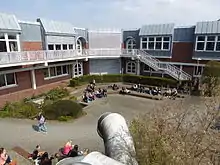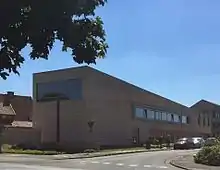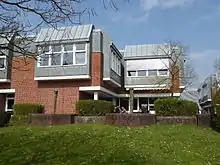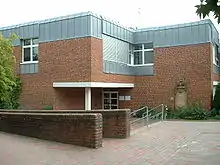University of Vechta
University of Vechta (Universität Vechta) is a small research university in northwestern Germany, in the town of Vechta in Lower Saxony. Its study programmes concentrate on teacher training, social sciences, social work, philosophy, and gerontology.






Background
The University has about 5,300 students (2016). It emerged from the former College of Education and belonged from 1973 to 1995 to Osnabrück University. From 1995 to 2010 it officially had the status of a "Scientific University of the State of Lower Saxony with university status". After a change of the Lower Saxony Higher Education Act, since June 2010 it may now officially call itself a university. Vechta as a place of study has been in existence since August 2, 1830 with the establishment of a normal school for the Grand Duchy of Oldenburg. The emphasis has historically been in the areas of teacher training and Catholic theology.
In 1830, the normal school for the education of Catholic elementary school teachers in the state of Oldenburg was founded, which was expanded in 1861 as a teacher training college. 1928 was the opening of the educational course in Vechta. On April 1, 1941, the "Oldenburgische Lehrerbildungsanstalt Vechta i. O. ", for whose accommodation the Dominikanerkloster Füchtel was confiscated. After the end of the Nazi-period, it was re-established (on 19 March 1946) as a confessionally bound State Pedagogical Academy Vechta. After the incorporation of Oldenburg in the Land of Lower Saxony on November 1, 1946, the Pedagogical Academy was transferred by decree of December 31, 1947 in the University of Education Vechta (PH Vechta). In 1965, the Lower Saxony Concordat guaranteed the education of Catholic teachers in Vechta. In 1969, the eight educational colleges in Lower Saxony were united to form the Lower Saxony University of Education. In 1973, the PH Vechta department/location of the newly founded University of Osnabrück. In the meantime the existence was massively endangered; in 1987 it even came to the recommendation of the Science Council to close the college.
The Vechta site became an independent university with its own study profile and focus on teacher training in 1995 under the name "Vechta University". With independence, several other programs have been established, including gerontology, cultural studies and geography. From October 2003, the courses were switched to the Bachelor / Master structure envisaged in the Bologna Process. The university began by transforming teacher education into two consecutive degree programs. The first graduates of the new form of teacher training received the certificates in August 2007. Thus Vechta University of Applied Sciences was among the first universities in Germany to graduate with a Master of Education (M.Ed.).
In October 2005, the former University of Applied Sciences Vechta merged with the Catholic University of Applied Sciences North Germany (KFH), which also resides locally. At the same time, the degree programs previously offered at the KFH and the gerontology and education courses offered at the university have been converted into new Bachelor's and Master's degree programs; the previous programs in the field of environmental sciences were discontinued.
After amendment of the Lower Saxony Higher Education Act, the name was changed to "University of Vechta" in 2010; this is linked to the right to doctorate or habilitate researchers. Already at the University of Applied Sciences Vechta, however, they were able to become Dr. med. phil. or dr. rer. nat. doctorate.
External links